G-ADHL. Short S.23 'C' Class Empire Flying Boat. c/n S.795. |
This was the first Empire boat to be completed and flown by Short Bros at Rochester, Kent The order was placed by Imperial Airways, London - January 24, 1935 The official written order shows the cost of the aircraft at UKP 37,800 - February 19, 1935 Converted to present day values this would be approximately UKP 3,417,876 Built as an S.23 Empire Class Mk.1 flying boat having 920 h.p. Bristol Pegasus Xc poppet-valve radial engines It was sometimes referred to as the 'prototype' Empire flying boat but this was incorrect It was always intended from the very beginning that it would be an 'active-working' aircraft It was fitted with the 'Type 1' fuel system - consisting of two fuel tanks of 326 gallons each The fuel tanks were mounted in the wing, positioned between the inner and outer engine This provided a flight duration of approximately 5 hours Its range in still air was 684 nm (1,270 km) or against a 35kt headwind the range was 517 nm (960 km) Entered onto the British Aircraft Register as G-ADHL (CofR 5881) - June 17, 1935 Registered to Imperial Airways Ltd, Victoria Station, London It was allocated a 'Fleet Number' (No. 1) which was used in all operational records to identify the aircraft Launched on the Medway River at Rochester without cabin fittings - July 02, 1936 The aircraft was named 'Canopus' Taxy trials carried out by the Short Brothers' Chief Test Pilot, John Lankester Parker - July 03, 1936 However as the aircraft had performed so well he decided to take-off and flew over Rochester for 14 minutes This was its unofficial 'first flight' A minor problem with the operation of the aircraft's flap system was encountered and this was quickly solved The official 'first flight' as 'G-ADHL' ( John L. Parker) flown - July 04, 1936 Test flown (one hour) to confirm that all minor identified issues had been rectified - July 06, 1936 During its fourth test flight (J. L. Parker) an engine failed during the 'take-off' run - July 10, 1936 The take-off was continued, climbed to required altitude, circled and returned to alight without further incident Position error checks conducted - July 13, 1936 During the next 6 - 7 weeks 'Canopus' underwent stringent testing of all systems and equipment to ensure that the design of the aircraft was robust and it would perform in accordance with the written specifications Test flown (Rochester) at 'full-load' weight - September 09, 1936 Following this flight the aircraft was beached for the interior 'fit-out' and 'furnishing' of the passenger cabins Relaunched at Rochester - September 17, 1936 Test flown (Major Herbert Brackley - Air Superintendent of Imperial Airways) - September 18 & 19, 1936 Test flown (J. L. Parker) with passengers - October 05, 1936 Passengers included: Lord Swinton (Minister for Air); Sir Edward Ellington (Chief of Air Staff); and their parties Test flown / demonstration flight (J. L. Parker) - October 06, 1936 Passengers included: Directors of Imperial Airways including Sir Eric Geddes and Sir John Reith Test flown (J. L. Parker) to test the Sperry auto-pilot to invited guests - October 06, 1936 Passengers included: Sir Samuel Hoare (the First Lord) and the Board of the Admiralty and guests Test flown (J. L. Parker) for fuel consumption test - October 09, 1936 Following this test flight the aircraft underwent the final fit-out prior to 'introduction to service' Test flown (J. L. Parker) for 20 minutes - October 20, 1936 The Certificate of Airworthiness (CofA No. 5694) issued - October 20, 1936 Two test flights flown (Major H. Brackley) - October 20, 1936 Following these test flights Major Brackley officially accepted the aircraft's Certificate of Airworthiness and took delivery of 'Canopus' on behalf of Imperial Airways Departed Rochester (Major H. Brackley) on its first route-proving flight to Caudebec (France) - October 22, 1936 On arrival at Caudebec the aircraft was delayed by bad weather Flown Caudebec - Hourtin - October 24, 1936 Flown Hourtin - Marseilles - Rome (Lake Bracciano) - October 25, 1936 Flown Rome (Lake Bracciano) - Brindisi - October 26, 1936 Flight crew: Captain F. J. (Frank) Bailey; F/O S. Long Flown Brindisi - Athens - Mirabella - Alexandria - October 27, 1936 Flight crew: Captain F. J. (Frank) Bailey; F/O S. Long Operated its first scheduled Empire Flying Boat service Alexandria - Brindisi as Flight IW490 - October 30, 1936 Flight crew: Captain F. J. (Frank) Bailey; F/O S. Long Whilst operating Athens - Alexandria as Flight AS412 the aircraft suffered an engine fire - January 10, 1937 The P.I.C. elected to make an emergency landing onto the Mediterranean Sea near Crete The aircraft was then taxied to the nearest port - Mirabella (Crete) The burnt-out engine was removed and a metal cocoon was fabricated and fitted to the engine's position It departed Mirabella on the ferry flight to England via Macon (France) for repairs - January 29, 1937 Repaired and returned to service Hythe - Alexandria as Flight IE531 - March 14, 1937 Operated its inaugural Southampton - Durban service as Flight AS453 - June 02 - 08, 1937 Flight crew: Capt. E. H. G. Attwood It carried 5 passengers and 1,032 pounds (469 kg) of mail on this flight This aircraft was part of the aircraft pool operated by Imperial Airways and Qantas Empire Airways on services between Southampton, England and Sydney, Australia Qantas Empire Airways crews flew the aircraft on the Sydney - Singapore - Sydney sector of this route between July 1938 and October 15, 1941 Qantas Empire Airways crews then took over the Singapore - Karachi - Singapore sector of the route from October 15, 1941 to February 15, 1942 when operations ceased due to Japanese war activities in South-East Asia Following the outbreak of World War II, 'Canopus' and all the other Empire Flying Boats were placed under the jurisdiction of 'National Air Communications' - August 31, 1939 Imperial Airways and the original British Airways were merged to form British Overseas Airways Corporation - April 01, 1940 Following Italy's entry into World War II, air routes across the Mediterranean Sea were closed - June 10, 1940 When this occurred 'Canopus' was enroute to Karachi from Singapore It returned to Singapore and remained there for 5 weeks, awaiting further instructions The 'Allied Airways Joint Committee' replaced the 'National Air Communications' - June 27, 1940 Under these organisations, the 'Empire' flying boats could be commandeered at any time or place for sometimes very secret and rather dangerous operations, depending on the wartime requirement It operated Singapore - Durban as Flight WS6 - July 28 - August 06, 1940 The aircraft was then based at Durban Ownership was officially transferred to British Overseas Airways Corporation - August 27, 1940 'Canopus' was fitted with three additional 220 gallon fuel tanks at Durban - ? 1940 This effectively doubled the range of the aircraft It was also refitted with four Pegasus XXII engines of 1,010 hp at Durban - ? 1940 It was operated on the 'Horseshoe Route' linking Durban to Sydney until Singapore fell to the advancing Japanese Army - February 15, 1942 It operated its last commercial service operating Cairo - Durban as Flight 2E630 - September 07 - 10, 1946 Ferried Durban - Poole (England) - October 12 - 16, 1946 It was offered to the Poole City Council for preservation but the offer was turned down Ferried Poole - Hythe - October 17, 1946 All useful equipment was then removed from the aircraft at Hythe Cancelled from the British Aircraft Register - November 12, 1946 It was the towed to Marchwood on Southampton Water - January 23, 1947 It was broken up at Marchwood by R. J. Coley and Sons, Ltd 'Canopus' had flown a total of 15,200 hours and approximately 2,000,000 miles |
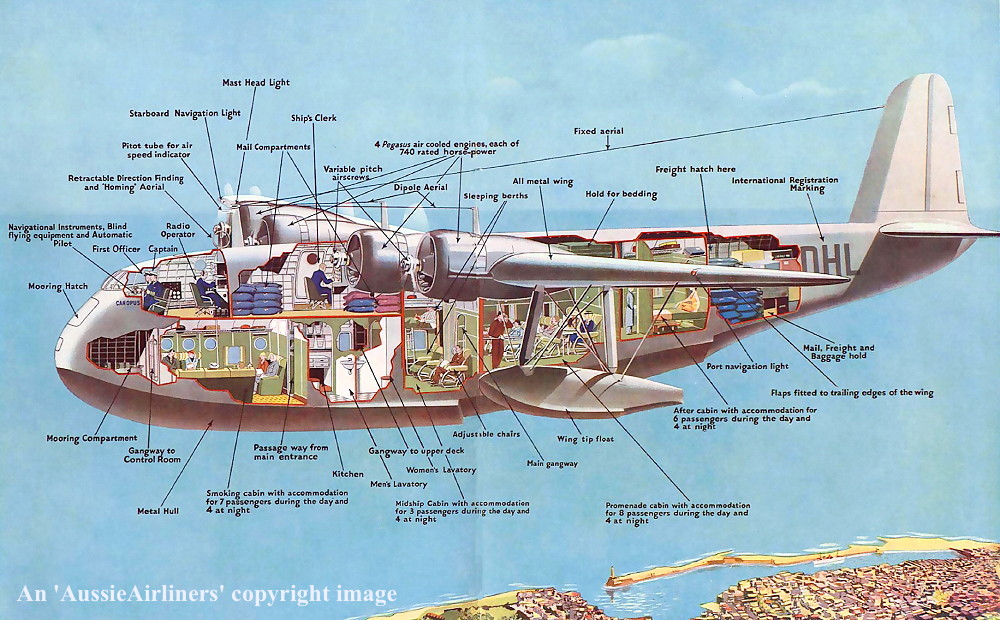 |
G-ADHL. Imperial Airways - 'Canopus' in the standard livery - interior cut-away. (R. N. Smith Collection Copyright Image 2545-803.) |
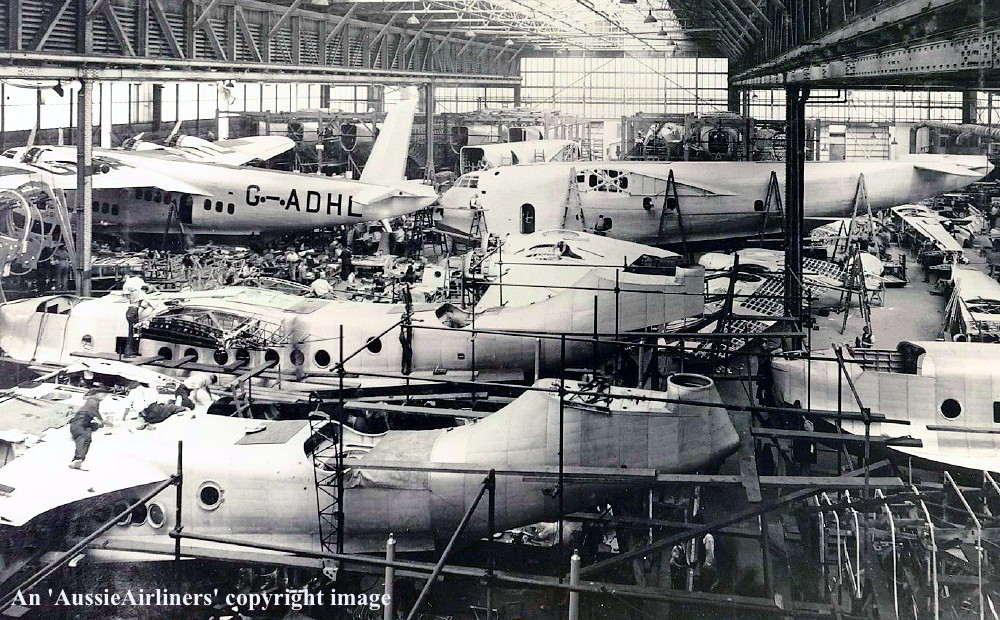 |
G-ADHL. Imperial Airways - in the standard livery at the Short Bros Seaplane Works, Rochester, circa 1936. (R. N. Smith Collection Copyright Image 2545-804.) |
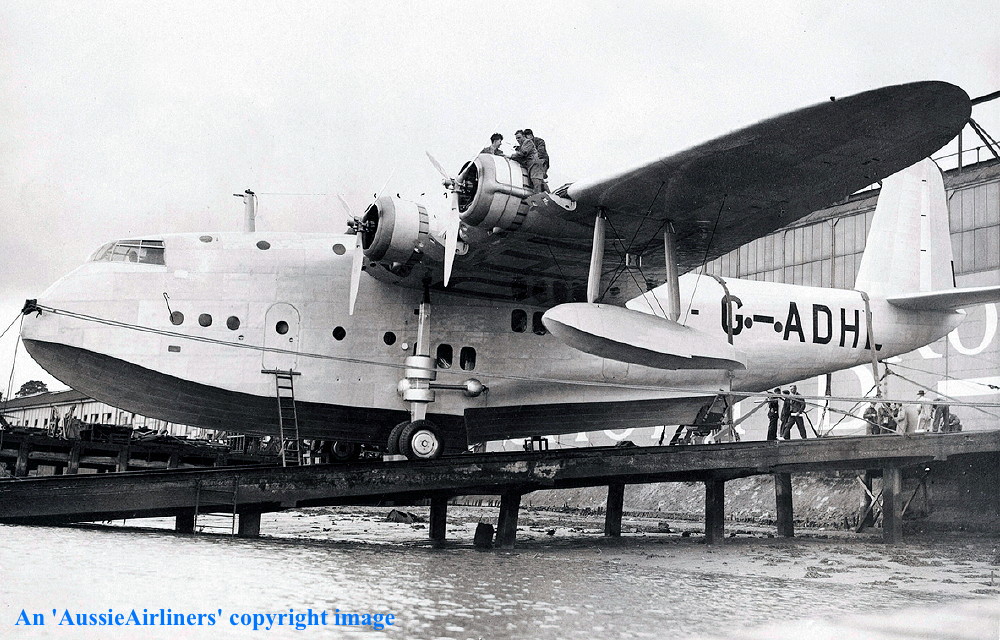 |
G-ADHL. Imperial Airways - 'Canopus' in the standard livery at the Short Bros Seaplane Works, Rochester, July 1936. (P. Sheehan Collection Copyright Image 2545-854.) |
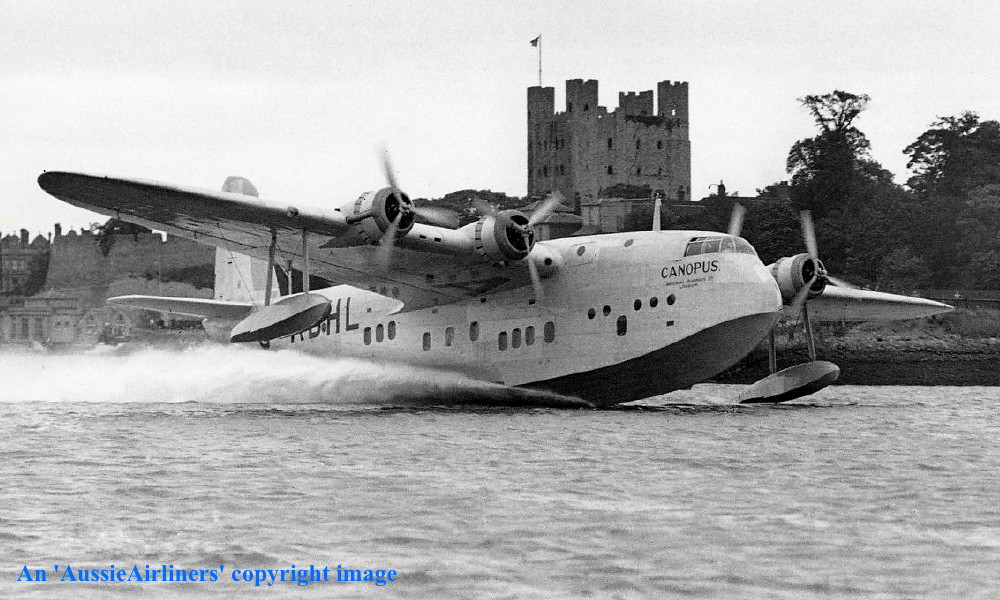 |
G-ADHL. Imperial Airways - 'Canopus' in the standard livery on the Medway River, Rochester, July 04, 1936. (R. N. Smith Collection Copyright Image 2545-806.) |
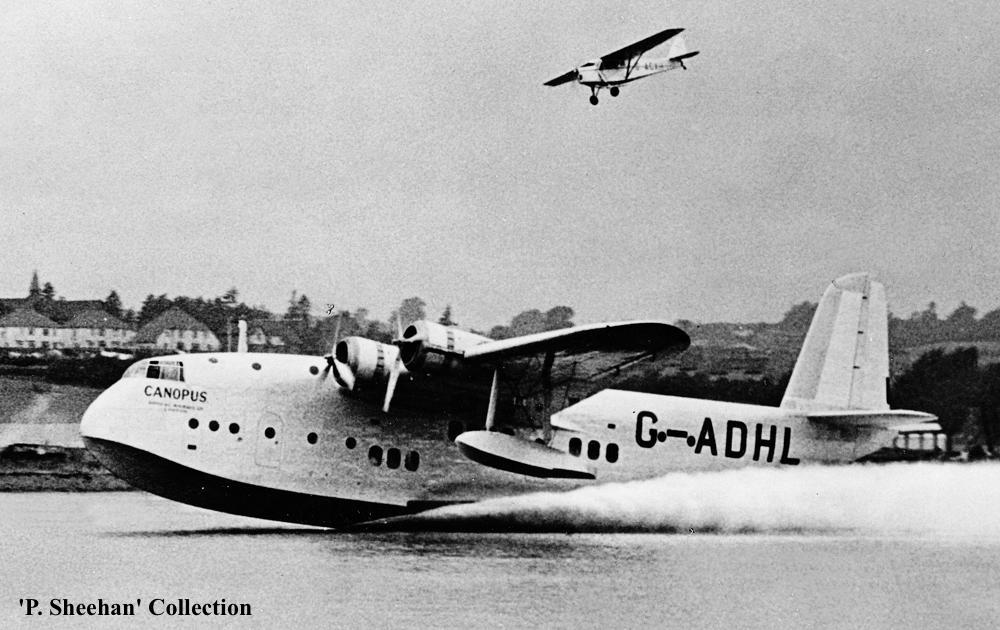 |
G-ADHL. Imperial Airways - 'Canopus' in the standard livery on the Medway River, Rochester, July 04, 1936. (R. N. Smith Collection Copyright Image 2545-806.) |
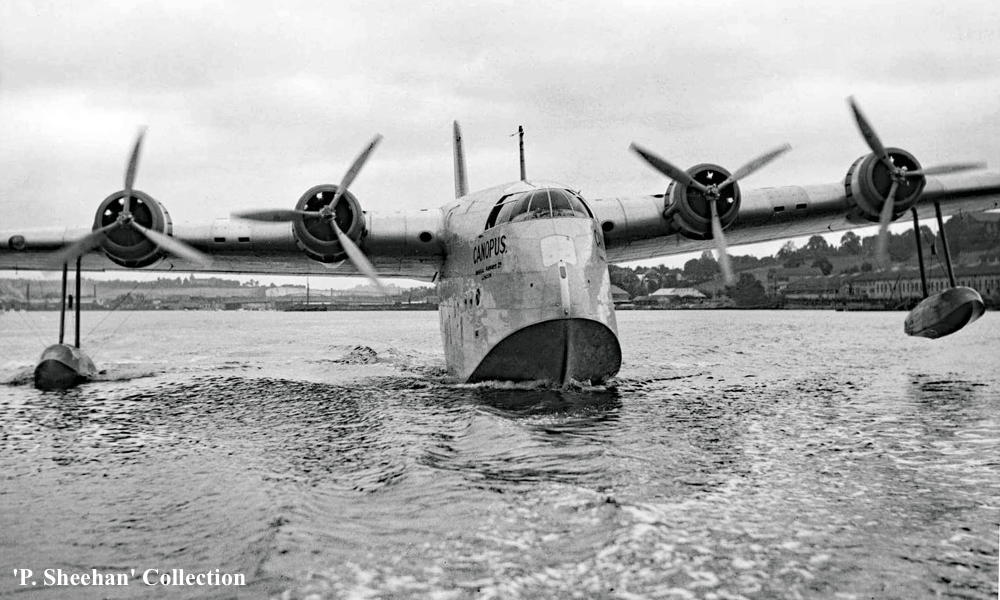 |
G-ADHL. Imperial Airways - 'Canopus' in the standard livery on the Medway, Rochester, circa 1937. (P. Sheehan Collection Copyright Image 2545-987.) |
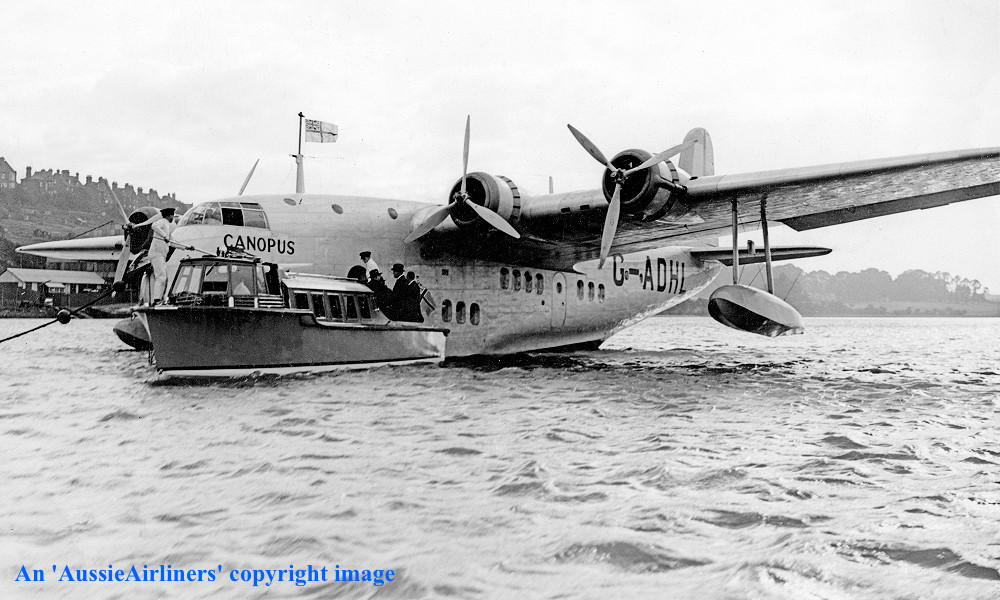 |
G-ADHL. Imperial Airways - 'Canopus' in the standard livery on the Medway, Rochester, circa 1937. (R. N. Smith Collection Copyright Image 2545-805.) |
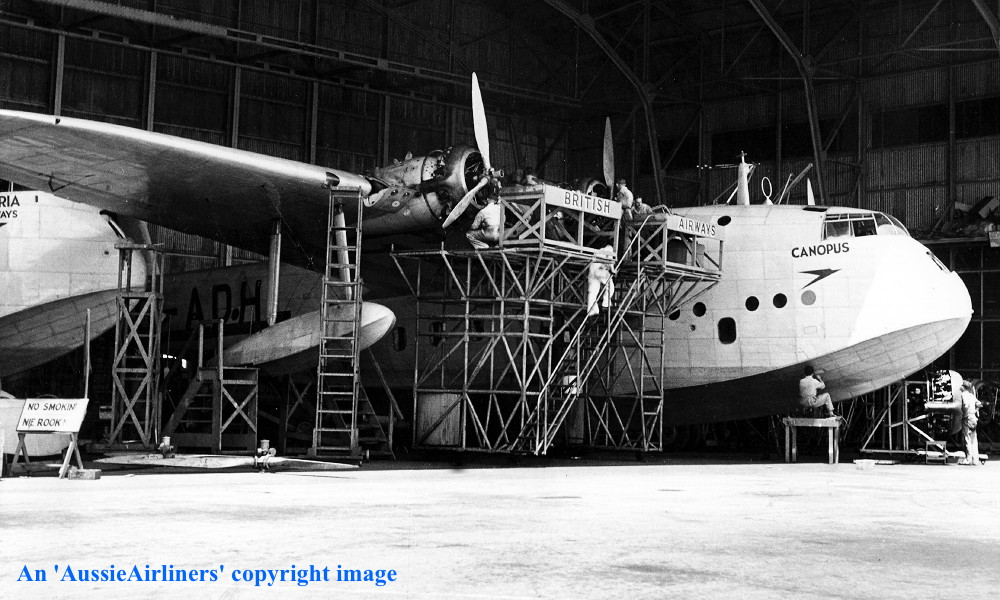 |
G-ADHL. BOAC - 'Canopus' in the standard livery at Hythe, date unknown. (R. N. Smith Collection Copyright Image 2545-258.) |